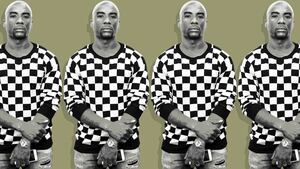On Tuesday afternoon, TIDAL, the Jay-Z-owned streaming service that announced its arrival with one of the more embarrassing public displays in recent memory, provided a millions-strong platform for an alleged serial rapist.
In since-deleted social media posts, TIDAL hyped the latest episode of its podcast Drink Champs, hosted by the rapper N.O.R.E. and DJ EFN. The topic of conversation was Black Lives Matter and the fight for social justice, and the guests included rappers Talib Kweli, Mysonne, and Bun B; academic Marc Lamont Hill; and Russell Simmons, the disgraced Def Jam Records co-founder who stands accused of sexually assaulting at least 13 women (and has since fled to Bali).

TIDAL immediately came under fire on social media for hosting Simmons—with one of his many victims, the activist and writer Sil Lai Abrams, leading the charge—and eventually deleted its tweets promoting the show. It’s extra disturbing given how, on June 10, Simmons appeared as a featured guest on the most popular hip-hop radio show in the country, The Breakfast Club, where his flimsy defenses against the many sexual-assault allegations against him went largely unchecked (its co-host, Charlamagne tha God, has his own problematic history with women).
Once again, Abrams kicked off a social-media campaign against The Breakfast Club, which airs on Diddy’s Revolt TV, and later appeared on the show to give Simmons and its irresponsible hosts a piece of her mind.

Sil Lai Abrams in On the Record
HBO Max“This is the second time in as many weeks that Russell Simmons has been given the space to speak out about issues around social justice on media platforms owned entirely or in large part by other Black media moguls,” Abrams tells The Daily Beast. “So Jay-Z, who positions himself as a staunch supporter of social justice, has allowed this to take place. And this is on the heels of the disastrous fallout from The Breakfast Club interview, in which Russell rambled for over an hour and was never fully challenged about the allegations against him.”
“Therein lies a big part of the problem: The movement for Black lives really should be interpreted as the movement for cisgender, heterosexual Black men’s lives. What we see with these media moguls is a replication of the oppression that they experience as Black men but they’re doing it to Black women. They’re using intimidation tactics by giving a serial predator like Russell Simmons a place online to terrorize his survivors,” she continues. “It also speaks to how interwoven all of the relationships within music—and in this case I’m speaking specifically about hip-hop—truly are. Because it cannot be a coincidence that two of the most prominent moguls in the industry [Jay-Z and Diddy] are quietly sliding Russell in on these discussions.”
Abrams was one of the three central figures featured in On the Record, the HBO Max documentary exploring the deeply disturbing allegations against Simmons. She was joined in the critically-acclaimed film by Drew Dixon, a former Def Jam A&R executive who claimed that Simmons raped her in 1995 while she was under his employ.

Drew Dixon in On the Record
HBO Max“It is as painful for me to see Russell Simmons coddled and propped up on The Breakfast Club and TIDAL as it is for me to see Confederate statues propped up all over this country canonizing men who raped and brutalized our ancestors,” Dixon tells The Daily Beast. “Russell’s appearances in these softball interviews by prominent Black men sends the message to me and all Black women survivors of violence within our own community that we don’t matter after all.”
Abrams, who also worked at Def Jam—and alleges she was raped by Simmons in his apartment in 1994, even filing a police report immediately after—feels the media is complicit in Simmons’ reign of terror.
“The Black community, particularly Black press—smaller, Black celebrity-focused press—has been radio-silent about sharing [On the Record],” says Abrams. “So, Russell popping up on these Black platforms speaks directly to the complicity of specific media outlets, especially those with strong entertainment ties and less journalistic integrity, to try to control the narrative around him.”
And it’s telling that Simmons has recently appeared on programs controlled by fellow hip-hop moguls Jay-Z and Diddy, two people who have openly and actively supported Black Lives Matter and #MeToo yet remain silent concerning the allegations against their industry pal.
“When I see men actively protect a Russell, it makes me question what they are hiding in their past,” says Abrams. “And what’s particularly telling is the subtle way that these men are signaling their support of Russell. They are not coming straight out and saying we stand by him, and did not join in with 50 Cent when he went on the attack over the film. They’re using their substantial media businesses to shut down discourse around the pervasiveness of sexual violence in the hip-hop community, and clearly signal to Black women that our lives and our issues don’t matter.”
She adds, “If you love Black women, if you believe Black women, then you do not give people like Russell a platform to talk about social justice.”


